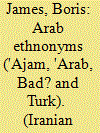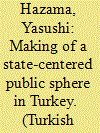| Srl | Item |
| 1 |
ID:
133819


|
|
|
|
|
| Publication |
2014.
|
| Summary/Abstract |
In general terms, the history of the Kurds in the medieval period-or at least those described as being Kurdish in our sources-has attracted relatively little attention within western academia. Moreover, those scholars who have thought to comment on the subject have in general relied on the work of the eminent Russian orientalist Vladimir Minorsky. Hence there has been very little re-examination of the Arabic sources which Minorsky consulted. This article constitutes a first attempt to re-examine some of the "historical orthodoxy" regarding the meaning and nature of the term Kurd in the Middle Ages. More precisely, it aims at questionning the work of those scholars who argue that, due to its ambiguous usage, the term Kurd in the medieval period did not denote an ethnic people. This paper argues that in fact the very ambiguity surrounding the term is indicative of its ethnonymic value and through an examination of the meaning of the term Kurd in this era we can gain a greater understanding of conceptions of ethnic difference in Arabo-Muslim sources.
|
|
|
|
|
|
|
|
|
|
|
|
|
|
|
|
| 2 |
ID:
132522


|
|
|
|
|
| Publication |
2014.
|
| Summary/Abstract |
Why has the state-centered recognition of the public sphere prevailed in Turkey over the last decade? A frame analysis of the public sphere discourse for 2002-09 reveals that the contingency of the discourse on the Islamic headscarf issue discouraged an essential understanding of the authentic public sphere. The dominant frame espoused by secularists claimed that the state banned headscarves in the public sphere were to preserve the neutrality of the public sphere. By contrast, pro-Islamists initially adopted an alternative counter-frame based on the Habermasian perspective, portraying the public sphere as tolerant of various ideas. Yet, in the face of stiff opposition from secularists, the pro-Islamists came to use a negative counter-frame with increasing frequency, implying that the state-centered public sphere impinged on the freedom to wear a headscarf. As a result, both the secularists' and pro-Islamists' frames helped entrench the recognition of the state-centered public sphere in Turkish society (Earlier and longer versions of this paper have appeared as IDE Discussion Paper Series No.262 (November 2010) and in Japanese in Ajiakeizai, Vol 52, No. 4 (April 2011)).
|
|
|
|
|
|
|
|
|
|
|
|
|
|
|
|